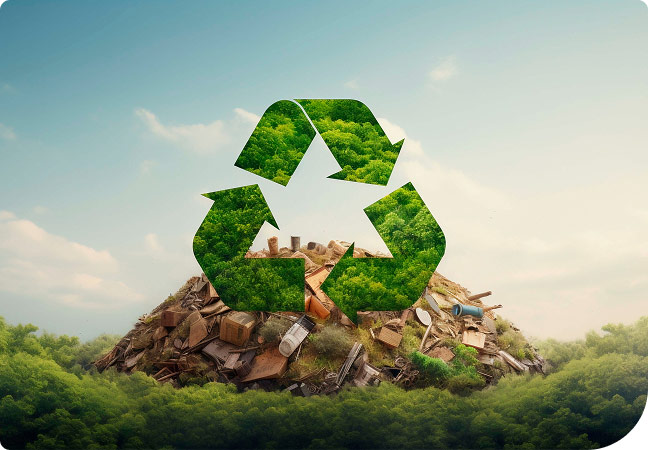Accessibility Menu
"വേസ്റ്റ് മാനേജ്മെൻ്റ്" എന്നത് സുരക്ഷിതവും പാരിസ്ഥിതിക ഉത്തരവാദിത്തവും ചെലവ് കുറഞ്ഞതുമായ രീതിയിൽ മാലിന്യങ്ങൾ കുറയ്ക്കുന്നതിനും കൈകാര്യം ചെയ്യുന്നതിനും സംസ്കരിക്കുന്നതിനും സംസ്കരിക്കുന്നതിനും ലക്ഷ്യമിട്ടുള്ള പ്രവർത്തനങ്ങൾ, പ്രക്രിയകൾ, തന്ത്രങ്ങൾ എന്നിവ ഉൾക്കൊള്ളുന്നു. മാലിന്യം കുറയ്ക്കലും തടയലും, പുനരുപയോഗവും കമ്പോസ്റ്റിംഗും, അപകടകരമായ മാലിന്യ സംസ്കരണവും സംസ്കരണവും, മാലിന്യ ശേഖരണവും ഗതാഗതവും, മാലിന്യ സംസ്കരണ രീതികൾ നിയന്ത്രിക്കുന്നതിനുള്ള നിയന്ത്രണങ്ങളും നയങ്ങളും നടപ്പിലാക്കൽ തുടങ്ങിയ സമ്പ്രദായങ്ങൾ ഇതിൽ ഉൾപ്പെടുന്നു. പൊതുജനാരോഗ്യം സംരക്ഷിക്കുന്നതിനും പ്രകൃതിവിഭവങ്ങൾ സംരക്ഷിക്കുന്നതിനും ഫലപ്രദമായ മാലിന്യ സംസ്കരണം അത്യാവശ്യമാണ്. മലിനീകരണം കുറയ്ക്കുക, സുസ്ഥിര വികസനം പ്രോത്സാഹിപ്പിക്കുക. മാലിന്യ ഉൽപ്പാദനം കുറയ്ക്കുന്നതിനും വിഭവ വീണ്ടെടുക്കൽ പരമാവധിയാക്കുന്നതിനും മാലിന്യ ജീവിത ചക്രത്തിലുടനീളം പാരിസ്ഥിതിക ആഘാതം കുറയ്ക്കുന്നതിനും സർക്കാരുകൾ, വ്യവസായങ്ങൾ, കമ്മ്യൂണിറ്റികൾ, വ്യക്തികൾ എന്നിവർ തമ്മിലുള്ള സഹകരണം ഇതിൽ ഉൾപ്പെടുന്നു.
SWM റൂൾസ് 2016 അനുസരിച്ച്, "വേർതിരിക്കുക" എന്നാൽ ഖരമാലിന്യത്തിൻ്റെ വിവിധ ഘടകങ്ങളെ തരംതിരിക്കുകയും വേർതിരിക്കുകയും ചെയ്യുന്നു, അതായത്:

Waste-to-energy (WtE) plants are facilities that burn municipal and industrial waste to generate electricity and heat. They are a way to manage waste, reduce greenhouse gas emissions, and recover valuable resources.
കൂടുതൽ വായിക്കുകRefuse derived fuel (RDF) means fuel derived from combustible waste fraction of solid waste like plastic, wood, pulp or organic waste, other than chlorinated materials, in the form of pellets or fluff produced ...
കൂടുതൽ വായിക്കുകMini MCF is a system for temporary storage at ward level for the waste collected from households and commercial establishments by Harita Karma Senas.
കൂടുതൽ വായിക്കുകFacility to store collected dry waste from mini-MCF/Houses/Institutions. Established in Grama Panchayats and wards of Municipalities and Corporations.
കൂടുതൽ വായിക്കുകRendering plants specialise in processing various waste materials, including bone, lard, tallow, and slaughter wastes from animals and chickens.
കൂടുതൽ വായിക്കുകCentralized composting facilities are locations that collect and process organic waste from various sources, such as homes, businesses, and institutions, to create compost for use as fertilizer.
കൂടുതൽ വായിക്കുകCentralized biogas plants are large-scale facilities that collect manure and other organic waste from a network of farms and other sources to produce biogas and recycle waste
കൂടുതൽ വായിക്കുകSanitary waste is a term for used hygiene products and other materials that can be contaminated with bodily fluids, such as blood, urine, and faeces.
കൂടുതൽ വായിക്കുകLive mapping based on the type of plant, stage, and given coordinates in the data entry
കൂടുതൽ വായിക്കുകA landfill is a site for the disposal of solid waste, where trash is buried between layers of earth. Modern landfills are well-engineered and managed facilities for the disposal of solid waste.
കൂടുതൽ വായിക്കുകA crematorium is a facility that houses a cremator, having a cremation chamber or retort which is able to generate about 850-1000 °C
കൂടുതൽ വായിക്കുകA slaughterhouse is a facility where livestock animals are slaughtered to provide consumables and designed to expedite the slaughter of live farmed animals.
കൂടുതൽ വായിക്കുക
ഏറ്റവും പുതിയ ഓർഡറുകളും പ്രസിദ്ധീകരണങ്ങളും എളുപ്പത്തിൽ കണ്ടെത്തുക.